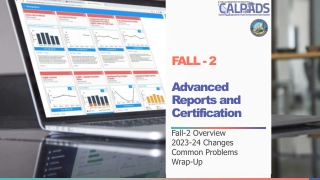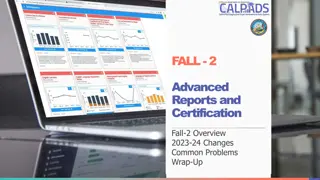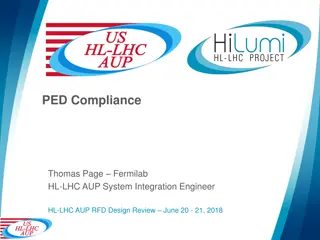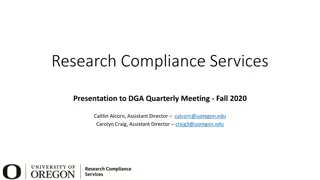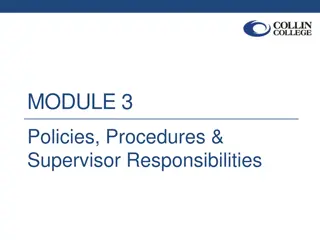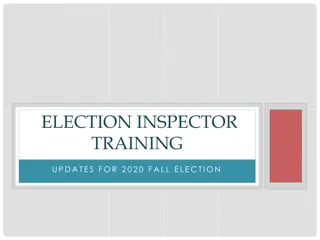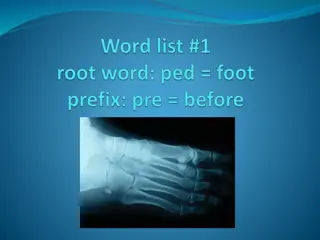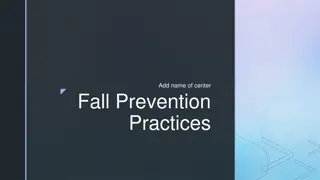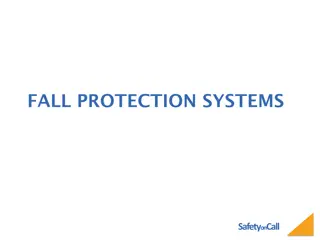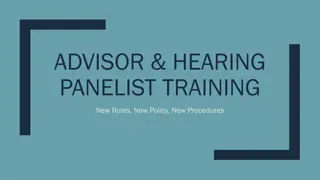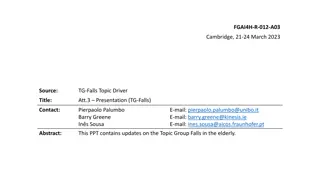Assessment Procedures and Norms at New Mexico Education Department
Xavier DeLeon, Assessment Coordinator at the New Mexico Public Education Department, outlines the session outcomes, assessment bureau norms, federal and state requirements, and the importance of understanding and following assessment-specific manuals. The department emphasizes the significance of policies related to test security, irregularities, assignments, and administration. Regular newsletters and meetings with advisory committees ensure educators are up-to-date on assessment procedures.
Download Presentation

Please find below an Image/Link to download the presentation.
The content on the website is provided AS IS for your information and personal use only. It may not be sold, licensed, or shared on other websites without obtaining consent from the author.If you encounter any issues during the download, it is possible that the publisher has removed the file from their server.
You are allowed to download the files provided on this website for personal or commercial use, subject to the condition that they are used lawfully. All files are the property of their respective owners.
The content on the website is provided AS IS for your information and personal use only. It may not be sold, licensed, or shared on other websites without obtaining consent from the author.
E N D
Presentation Transcript
Policies & Procedures Xavier DeLeon Assessment Coordinator New Mexico Public Education Department Investing for tomorrow, delivering today.
Agenda Introductions New Mexico Administrative Code Session Outcomes Roles & Responsibilities Assessment Bureau Norms Irregularities Minimum Federal Testing Requirements Site Monitoring Process Federal Statute New Mexico Statue
Session Outcomes 1. Understand policies pertaining to: a. Test security b. Testing irregularities c. Test assignment d. Test administration 2. Be prepared for test administration
Assessment-Specific Manuals PLEASE NOTE: This training does not take the place of reading and understanding all appropriate manuals and other test administration materials. The following manuals also apply: Test Coordinator Manuals (TCMs) Test Administration Manuals/ Directions for Administration (TAMs/DFAs) Accommodations Manuals
Assessment Bureau Norms We send out a bureau newsletter which gets distributed to Superintendents/Charter Leaders COVID-19 Habit Superintendents receive information twice a week Assessment bureau newsletters are distributed biweekly to Supts. first and then to DTCs; currently about 2 newsletter per month Emails from teachers, parents, STCs, or others will be redirected to the DTC; However if we do respond to an inquiry we will copy the DTC. Program mangers have a 24 hr. response time 5 Investing for tomorrow, delivering today.
Assessment Bureau Norms We hold monthly meetings with our Assessment and Accountability Advisory Committee (AAAC) We also have ad hoc meetings with our national Technical Advisory Committee that provide technical guidance to both assessment & accountability bureaus. Professional development opportunities are offered throughout the year; these are noted on an new interactive DTC calendar. Bureau program pages are updated regularly check regularly for any updates and typically noted in newsletter. 6 Investing for tomorrow, delivering today.
Federal and State Requirements Educators know statute, code, and procedures Test Students Statute, code, and procedures in place administration and security procedures followed demonstrate what they know and what they can do Valid test results 7 Investing for tomorrow, delivering today.
Minimum Federal Testing Requirements Minimum Federal Testing Requirements Under the Every Student Succeeds Act (ESSA), states must administer annual tests in: Reading and math in grades 3-8 and once in high school NM ESSA plan includes student growth, which means testing in grades 3-8 and 10-11 Science in grade bands 3-5, 6-9, and 10-12 Alternate Assessments English language proficiency assessment (ELPA) for English Learners (ELs) ESSA References: 1111(b)(2) Academic Assessments ESSA 1111(b)(2)(B)(vii) Els and SWDs 1111(b)(2)(G) ELPA 8 Investing for tomorrow, delivering today.
Federal Statute Individuals with Disabilities in Education Act (IDEA) Rehabilitation Act (Section 504) Equal Educational Opportunities Act Civil Rights Act Family Educational Rights and Privacy Act (FERPA) Health Insurance Portability and Accountability Act (HIPAA) 9 Investing for tomorrow, delivering today.
New Mexico Statute NMSA 22-2C Assessment & Accountability Act Assessment system Accountability and reporting Adoption of content and performance standards NMSA 22-13-1.1 Graduation Requirements Coursework and competency requirements Competency: math, reading, writing, science, social studies 10 Investing for tomorrow, delivering today.
New Mexico Administrative Code (NMAC) 6.10.7 NMAC Standardized Testing Procedures and Requirements Roles & responsibilities, licensing Test administration & security 6.19.7 NMAC Demonstration of Competency for Graduation 6.29.1 NMAC Standards for Excellence Section K, graduation requirements 11 Investing for tomorrow, delivering today.
Any Questions? 12 Investing for tomorrow, delivering today.
Roles & Responsibilities School A Test Administrators, Proctors STC, Principal School B District Test Coordinator(s) Test Administrators, Proctors STC, Principal District Charter, Test Administrators, Proctors PED Assessment Bureau School Test Coordinator State Charter & State-Supported Institution Test Administrators, Proctors Test Coordinator 13 Investing for tomorrow, delivering today.
6.10.7.7 NMAC PED License Responsibilities Teacher Administrator Counselor Student success advisor Liaison with PED, vendors, STCs Know 6.10.7 NMAC, manuals, PED trainings, technology specifications, accommodations District test security policy, train STCs, TAs Reports irregularities to PED DTC District Test Coordinator Know 6.10.7 NMAC, manuals, district policy Train TAs, proctors Secure test materials, testing environment Assigns Accommodations and accessibility features STC School Test Coordinator DTC licenses or Instructional support provider TA Test Administrator Administers tests, following security policy Ensures Accommodations and accessibility features are enabled Same as STC Can be EA, administrator, or trained volunteer Proctor Assist TA monitoring students 14 Investing for tomorrow, delivering today.
Superintendents/Charter Directors Role Appoints DTC and Technology Coordinator Designates every year and when DTC member changes Verifies that all test security, staff training, and accommodation requirements have been met each semester Submits verification form within 10 days after testing to DTC 15 Investing for tomorrow, delivering today.
DTCs Role Serves as the primary liaison for PED and testing vendor communications Submits all forms Serves as source of assessment information for district and school staff, parents, community Attends all mandatory PED trainings Develops local district/charter test security policy Trains STCs and all personnel involved in testing 16 Investing for tomorrow, delivering today.
DTC Role, cont. Ensures student pre-ID data is accurate and current; Ensures student accommodations have been assigned according to IEPs; Ensures TAs are licensed, certified, trained, and sign the required Confidentiality Agreement; Utilizes a secure area to store test materials; Receives and inventories all test materials according to the packing list; and Reports testing irregularities within the required timeframe in the Test Coordinator Portal (TCP) Retains all documentation for (5 years) 17 Investing for tomorrow, delivering today.
Principals Role Attends all trainings held by DTC or STC Verifies that all test security, staff training, and accommodation requirements have been met each semester Submits verification form within 10 days after testing to DTC 18 Investing for tomorrow, delivering today.
STCs Role Attends trainings DTC deems mandatory Ensures district policy followed at all times Ensures TAs and proctors are licensed, certified, trained, and sign the required Confidentiality Agreement; 19 Investing for tomorrow, delivering today.
STC, cont. Testing locations 25:1 ratio (see pp. 9-10) Materials removed (see p. 16) Utilizes a secure area to store test materials Ensures student accommodations have been assigned according to IEPs Verifies that all technical requirements have been met Verifies that students use correct tickets or labels Reports irregularities to principal and DTC May want to revisit this given COVID 19 in Spring; health order and executive guidance would trump this ratio 20 Investing for tomorrow, delivering today.
District Policy At least as rigorous as state Secure materials location and process identified Scheduling Allow enough time with breaks PBT: all schools in district follow same schedule to extent possible; follow order in booklets CBT: schedule same content/grade as close together as resources permit 21 Investing for tomorrow, delivering today.
Document Retention Keep secure: Paper forms and tickets should be locked and secured while in LEA possession. Keep for 5 years: Forms related to DTC training (e.g., Confidentiality, Superintendent verification, training verification sheets/sign in documents, Medical Exemptions, Testing Irregularity Forms, and waivers) Destroy After Testing: Scratch paper, test tickets, formula sheets if they have writing. Return on Time: PED will be auditing schools/district with history of missing materials. Proper packaging of paper test materials and scorable forms is the responsibility of the district. 22 Investing for tomorrow, delivering today.
Missing Materials Loss of state testing materials is a security breach. TA must report missing materials to STC. DTC must also notify the vendor s help desk and PED Missing test materials should be reported as an irregularity Exception to this would be ACCESS; WIDA has their own testing materials form 23 Investing for tomorrow, delivering today.
Any Questions? 24 Investing for tomorrow, delivering today.
Testing Irregularities: Is every incident an irregularity? DTC notifies PED within 3 days, conducts investigation DTC submits irregularity report w/recommendation within 10 days PED determines whether test result is valid or invalid Testing Irregularity DTC contacts PED program manager for the assessment PED program manager decides whether incident should be reported DTC submits irregularity report or documents file, as directed Incident DTC thinks may constitute an irregularity DTC documents incident but does not submit to PED Documentation retained for 5 years Incident that does not constitute an irregularity 25 Investing for tomorrow, delivering today.
Examples of Irregularities Cell phones or other non-allowable electronic devices Student is sick and needs to leave during the test Starting a test without the proper accommodations or accessibility features in place or given the wrong accommodation based on the IEP Students move past the current test session TAs deviate from administration directions or script TA or proctor is not present while student s are taking the test 26 Investing for tomorrow, delivering today.
Avoiding Irregularities Before They Happen Scheduling Sufficient time to complete test sessions before lunch or by end of day Routine Breaks Before testing students correctly matched to the SSID on the label or ticket accommodations and accessibility features assigned technology and materials ready and working properly students do not have unauthorized electronic devices Monitor actively during and after test sessions 27 Investing for tomorrow, delivering today.
Reporting Irregularities Testing Irregularities must be reported through the PED Test Coordinator Portal. Please contact PM within 3 days with any concerns. Submit form within 10 days of incident. Only in extreme cases will PED allow irregularity forms to be submitted through email. 28 Investing for tomorrow, delivering today.
Void/Invalidate Void/Invalidate locally: if test is not submitted Wrong test started Inappropriate accommodation Must complete an irregularity form and retain locally for 5 yrs. Void/Invalidate by PED: if test has been submitted Contact PED who will contact the vendor Will work with accountability and vendor to process invalidations Must submit an irregularity form to PED 29 Investing for tomorrow, delivering today.
Site Monitoring Process Monitoring visits ensure that all state and federally required assessment programs are conducted according to state and federal regulations. The assessment bureau conducts visits as needed, and will contact you prior to scheduling a visit DTCs will be asked a series of interview questions, and be required to provide documentation for communication, staff training, test security, test environment, and participation. 30 Investing for tomorrow, delivering today.
Any Questions? 31 Investing for tomorrow, delivering today.
32 Investing for tomorrow, delivering today.


